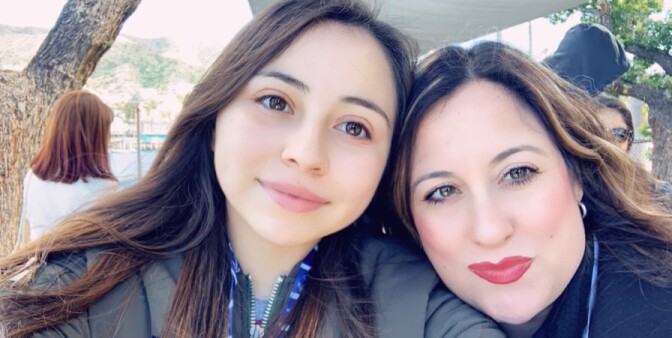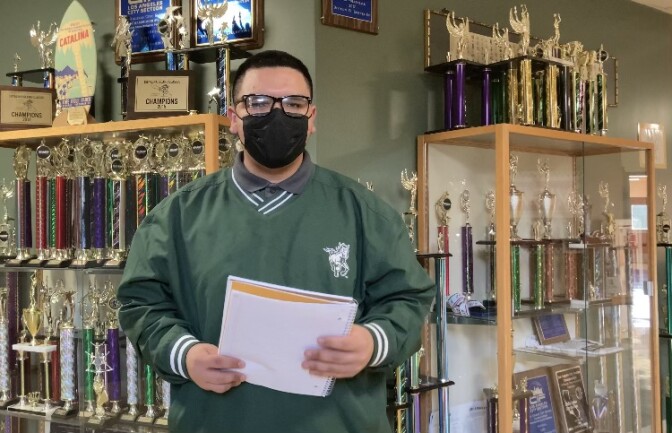April, for many high school seniors, has an emotional cruelty unique to the year-plus college application and admission process. It’s the period between the time when most college acceptance notifications arrive in late March and the May 1 deadline to choose one college to attend.
“It's a really tough decision,” said Joseph Rodriguez, a senior at Vaughn Next Century Learning Center in L.A.’s San Fernando Valley. “You're totally confused, like, you just don't know what you're going to be doing for the next four years.”
For many seniors like Rodriguez, waiting for acceptance letters led to feelings of anticipation. But these few weeks of weighing their choices and picking one campus is leading many 12th graders to feel an uncertainty they haven’t felt before. They say people who aren’t going through this process don’t understand.
“You're totally confused,” Rodriguez said.
Read Our Whole Guide To Going To College
Rodriguez sees his life taking very different turns depending on which college he chooses to attend out of all the ones that have accepted him: USC, UC San Diego, CSUN, Cal Poly San Luis Obispo, Cal Lutheran University, Loyola Marymount University, Rochester Institute of Technology and four others. (He applied to 17 schools.)
He has support from his Mexican immigrant parents. He’s the first in his family to be accepted to college. For him, one of the biggest worries is doing the math to see which college will give him the best financial aid package. That and choosing a college close to home or far away are the biggest factors.
For many 12th graders, choosing a college is one of the biggest decisions they’ve had to make. They feel the weight on their shoulders in these weeks before May 1.
“I just think it's almost just the fear of the future,” said Oliver Wright, a senior at North Hollywood High School.

He’s weighing acceptance letters from UCLA, UC San Diego, UC Davis, George Washington University, and King's College London. He’s taking second tours of campuses in California to help him make up his mind, but the decision’s not getting easier.
“At some point you just kind of do have to commit,” Wright said.
Yes ... by May 1.
How students are creating healthy networks to support each other
Many public high schools have strong college-going cultures supported by staff. The wheels of that support start turning faster by the junior and senior years.
By April of senior year, students are creating their own spaces.
“I created a Discord server and we collaborate and communicate to each other,” Rodriguez said.
He says the 10 members of the online group are all seniors in his class. The most important thing, he said, is to keep the tone positive and supportive. Unwritten rules of etiquette allow for boasting but not too much for fear of hurting others’ feelings.

Students in the group began receiving college acceptance letters and posting the results, Rodriguez said, “then we like, slowly start shifting the subject to something else” because of the sensitivity of bringing up the names of colleges others may not have been accepted to.
Seniors also have their text threads with close friends, and some look for larger, open platforms, like Reddit’s Applying to College page.
Some students prefer to keep their college choice deliberations close to home.
“It's like talking about any sensitive subject, it’s like talking about someone having like family problems or something like that,” Wright said. He said larger, open college choice discussions often turn toxic.
“There's a lot of emotional investment and you don't want to hurt someone,” he said.
Wright and other 12th graders say the adults and peers around them are mostly aware of what they’re going through as May 1 approaches. But some of those adults have found that seniors’ momentous decisions have led to teachable moments for the adults too.
What to say (and what not to say) to students weighing their college choices
While college choice may be the first major choice a teenager makes, the looming voice and influence of a parent, parents, guardian, or close relatives can weigh heavily.
“I was already judging [my daughter],” said Melina Gonzalez, whose daughter Alex Ahumada was a senior last year.
The family doesn’t qualify for financial aid, Gonzalez said, so she was pushing her daughter to commit to Cal State San Bernardino, which was close to their home.

“You have a room here ... San Bernardino is cheap, I can pay for it,” she said.
But her daughter pushed back, telling her mother she wanted to go farther from home and live in the dorms to have the full college experience. Gonzalez had told her daughter that she loved her experience at Whittier College because she lived in the dorms all four years, all made possible by financial aid. That pushback changed Gonzalez’s approach.
“You're right, babe,” she told her daughter. “I can't limit you. You're right, I shouldn't have to tell you not to do that just because of our situation.”
So the family found a way, and Gonzalez’s daughter now attends Grand Canyon University, a private, Christian university in Phoenix. It’s more expensive than an in-state school might be, but Gonzalez’s daughter earned so many college credits in high school that she’s about a year and half ahead. Gonzalez says she’ll only have to pay about two years of full tuition.
What makes Gonzalez’s situation more resonant is that she’s a high school counselor in the Perris Unified School District who helps students apply to college.
She has over two decades of experience as a counselor, but her daughter’s college choice in April of last year taught her a lesson.
“I'm speaking to my [students] differently,” she said.
She gives students information and advice through the application process but she tries not to influence the college choice, she said, because students have to live with that choice.
She has advice for parents:
- Don't be so judgmental.
- Hear your child out.
- Don’t automatically say 'no.'
- Don’t dictate solutions — help your child find solutions.
Adults, Gonzalez said, shouldn’t lose sight of the most important role they have: to be enablers of these young adults’ futures.
“I'm pursuing a PhD in physics,” Joseph Rodriguez said. “My goal is to make technology… [to] be able to advance technology to push human knowledge to its limit."









